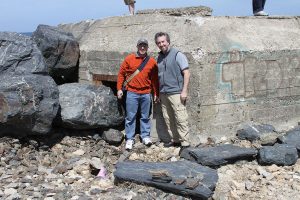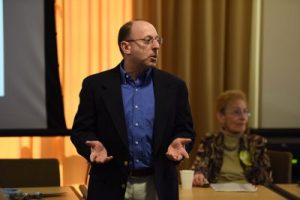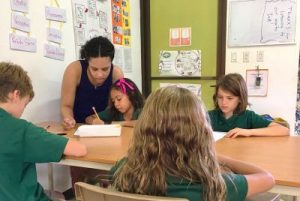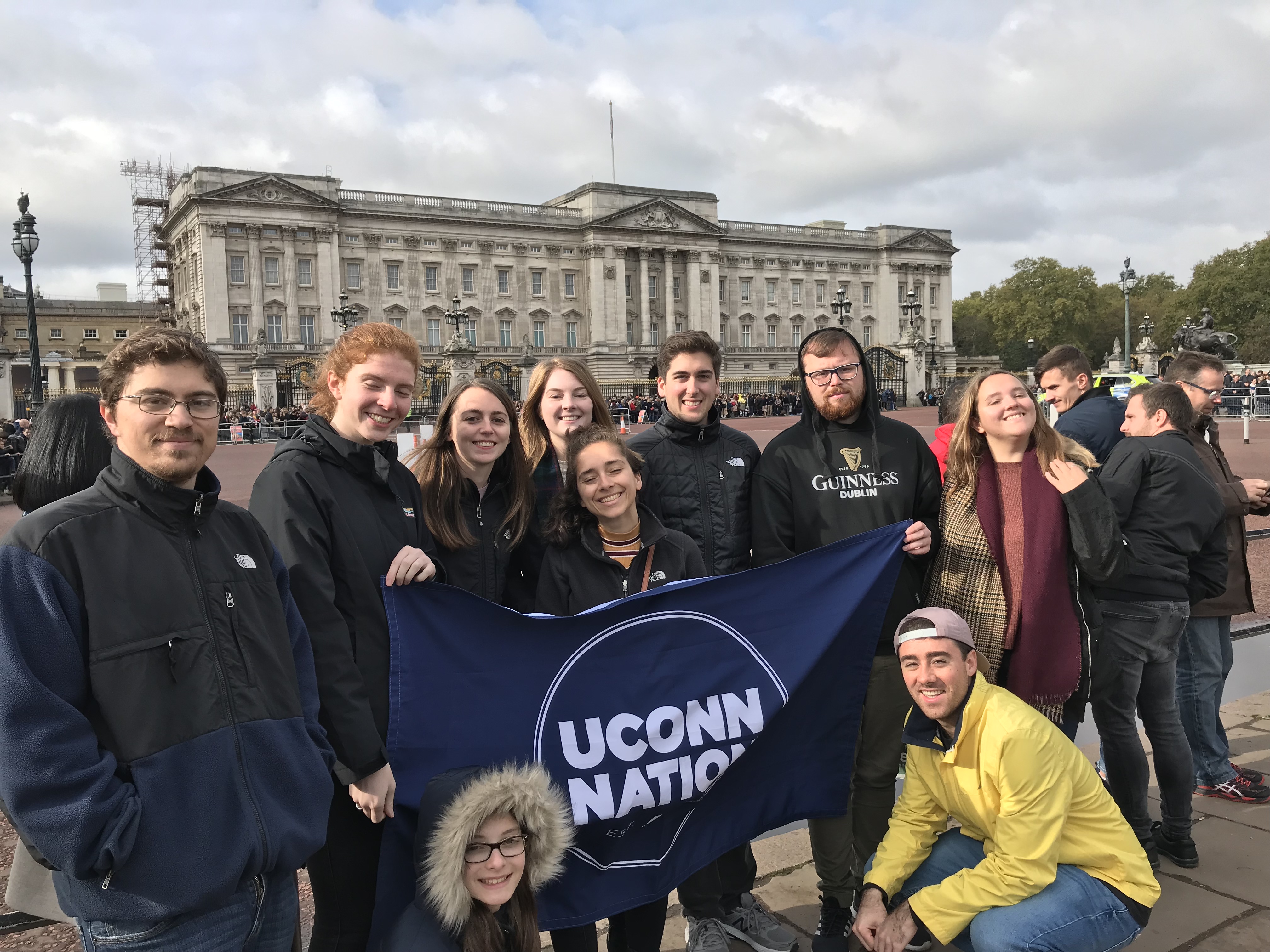
Associate Professor David Moss has spent the past six years actively expanding Neag School study abroad programs around the world as the Neag School’s global education director, and the past 20 years coordinating UConn’s long-standing London study abroad program in education.
The London program has brought hundreds of aspiring teachers from the Neag School to London for a semester of living, teaching, researching, and studying. Over the years, as the program started to receive an even greater influx of applicants, Moss saw a need to create a more extensive range of study abroad opportunities for Neag School students.
Richard Schwab, Neag School dean emeritus, appointed Moss as the inaugural director of the School’s Global Education program to oversee the growth and research opportunities involved in study abroad.
“I saw that as an opportunity to work formally with great faculty who already had lots of interest,” says Moss.
Having coordinated the London program for many years, Moss felt he had everything in place to be able to build new international programs from the ground up. He says he acted as a facilitator and critical friend with whom faculty members could share their ideas for such programs.
“I think a lot of faculty have a good sense of why they want to go and set up a program for their students, but creating that vision in detail, that allows us to bring those programs to reality, takes many steps,” says Moss
“This, to me, was the first time in my career that I felt like I was a part of something that was truly transformative for our students and for our teacher education program.”
— Associate Professor David Moss

The first faculty member to jump on the opportunity to expand global education at the Neag School was Professor Alan Marcus. He sought to start a May term program focused on World War II history. The program, which ran from 2011 to 2013, brought preservice social studies teachers on a two-week trip throughout Europe to visit different World War II historical sites.
“We were a great team, in that he handled everything in terms of international travel, and I handled all the trips to museums and the content portion of it,” says Marcus.
The success of the World War II program inspired Marcus to want to start a full-semester program for aspiring social studies teachers at the University of Nottingham in the U.K. The semester-long program, which launched in Fall 2015 and at the time nearly doubled the number of Neag School students studying abroad, connected master’s students who had completed their student teaching with internships at Nottingham-area schools and museums. Again, Moss proved instrumental in formulating the logistics.
“He knew all the right questions to ask in terms of how we partner with a university, how we find housing, how we set up internships and schools,” says Marcus. “His expertise was critical in setting that up.

With a vision to get as many preservice teachers abroad as possible, Moss has since helped establish Neag School study abroad programs in South Africa, Costa Rica, Peru, Australia, and, most recently, Iceland. While each program has its own unique attributes based on the context of the host country, the London program acted as a well-researched and successful model from which to consider all other programs. During the 2018-19 academic year alone, nearly 40 Neag School students studied in four locations around the world, and more than 10 Neag School faculty were actively engaged in Neag School-affiliated Education Abroad programs.
During this same period, the University of Connecticut also became one of three universities in the United States invited to join Universitas 21(U21), a prestigious network of research institutions involved in global education. U21 has offered UConn faculty opportunities to expand their international network, take part in workshops, and collaborate on research with colleagues at international institutions. At the same time, U21 has afforded UConn students with opportunities to share projects they have led with experts in academia and industry, take part in online competitions, attend research conferences, and, of course, study abroad.
Supporting Students in and Beyond Study Abroad
The London program experience is more than just a semester abroad. Prior to studying abroad in the fall semester, students are required to take a graduate course over the summer that involves several intercultural learning components. After their semester abroad, students enroll in a reentry seminar to unpack their cultural learning experience.
The experiences of teaching and interacting with communities in international settings have brought new and valuable perspectives to the education of these aspiring teachers. “Taking them out of their comfort zones,” Moss has shared in the past, “can help them develop the empathy and understanding of what it’s like for students in their own classes.” In addition, the lessons students learn in intercultural competence ensures that students gain “the skill sets to negotiate with parents, communities, and students who have viable cultural norms and systems other than their own.”
Jonathan Simmons ’11 (ED), ’12 MA, now a doctoral student in the Department of Curriculum and Instruction, says his relationship with Moss and his study abroad experience in London allowed him to gain a deeper understanding about the complex ways in which students see the world.
“David is really good at getting you to think about yourself and your own lived experiences through a different lens.”
— Jonathan Simmons ’11 (ED), ’12 MA
“David is really good at getting you to think about yourself and your own lived experiences through a different lens,” says Simmons.
After graduating from the Neag School’s Integrated Bachelor’s/Master’s program in 2012, Simmons went on to teach internationally in Morocco and Mexico. He maintained his relationship with Moss over the years and returned to the Neag School in 2019 to pursue a Ph.D.
“Nothing felt familiar to me when I started teaching internationally, and I think I would’ve struggled a lot had I not had that experience with David to learn how to interpret culture,” says Simmons.
Finding Fulfillment in Student Growth
Moss says one of the most rewarding aspects of his role has been seeing the growth in his students over the years. Whether a student was an experienced traveler before studying abroad or was setting foot on an airplane for the first time, Moss says it was rewarding to support them wherever they were and help them immerse in the idea of intercultural learning.
During his time as the director of global education, Moss, with fellow faculty at the Neag School and beyond, has published book chapters and research articles that describe the effectiveness of these study abroad programs and document student growth.
“We have a lot to be proud of,” says Moss. “We’ve been really successful in helping our students grow, and the research data really does support that.”
Moss says it has been an honor and a privilege to see how his students continue their intercultural work in their professional lives.
“This, to me, was the first time in my career that I felt like I was a part of something that was truly transformative for our students and for our teacher education program,” says Moss.
Saran Stewart, a new faculty member from the University of West Indies, has been recently named the next global education director for the Neag School.
Related Stories:
- A Closer Look at the London Study Abroad Internship Program
- Special Education Abroad: Teaching in U.K. Classrooms That Offer ‘Safe Space for Recovery’
- Neag School Explores Greater Internationalization of Teacher Education With Visit to Germany
- Moss a Champion for the Globally Literacy Skills That Teachers and Students Need



